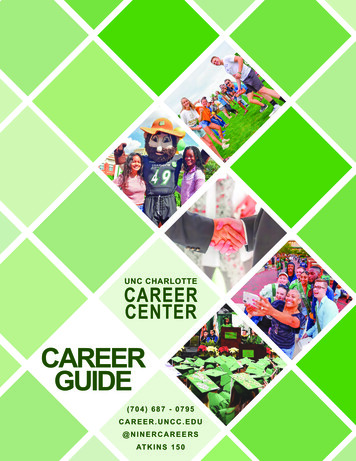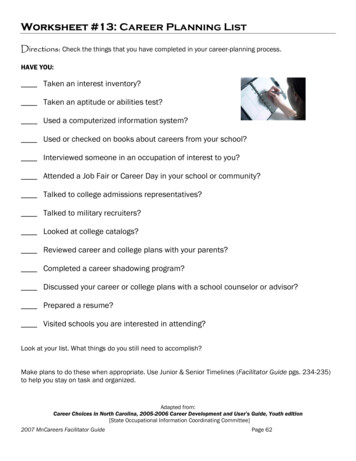
Transcription
FindingYour Careerin Health CareNew Hampshire Area Health Education Center5th edition
Finding Your Careerin Health CareNew Hampshire Area Health Education Center5th edition
AHEC staff would like to thank the manyhealth care professionals and associationsthat contributed to this revision.Northern NH AHEC262 Cottage Street, Suite 230Littleton, NH 03561(603) 259-3700(603) 444-0945 (Fax)www.nchcnh.orgAHECSouthernNew HampshireArea HealthEducation CenterSouthern NH AHEC128 State Route 27Raymond, NH 03077(603) 895-1514(603) 895-1312 (Fax)www.snhahec.orgnhA HE CNew HampshireArea HealthEducationCenterNH AHEC Program OfficeThe Dartmouth Institute forHealth Policy & Clinical PracticeWilliamson ResearchTranslational Building, Level 5One Medical Center DriveLebanon, NH 03756tdi.dartmouth.edu/nh-ahecThank you to all of our local partners for providing images for inclusion in the catalog.
Table of Contents5What is AHEC?5Emerging Careers6Integrated Health Care7Focus on the Future8A Self Assessment10 Careers & Academic Requirements15 Allied HealthAthletic TrainerAudiologistMedical IllustratorOccupational TherapistOccupational Therapy AssistantPhysical TherapistPhysical Therapy AssistantRespiratory TherapistSpeech-Language PathologistSpeech-Language Pathology Assistant23 Behavioral HealthCounselorDrug and Alcohol CounselorHuman Service WorkerSocial WorkerTherapist28 Career Pathway: Behavioral Health29 Career Pathway:Substance Use Treatment30 Behavioral Health SupportCertified Recovery Support WorkerCritical Time Intervention (CTI) WorkerPeer Recovery CoachPeer Support SpecialistTABLE OF CONTENTS34 Clinical Laboratory ScienceClinical Laboratory hnologistMedical TechnologistPhlebotomist39 Complementary Medicineand TherapiesAcupuncturistMassage TherapistRecreation Therapist42 DentistryDental AssistantDental HygienistDental Laboratory TechnicianDentist47 Diagnostic and TechnicalInstrumentationCardiovascular Technologist/TechnicianElectroneurodiagnostic TechnologistPerfusionistPolysomnographic Technician52 Emergency Medical ServicesEmergency Medical DispatcherEmergency Medical Technician andAdvanced Emergency MedicalTechnicianParamedic — Community Paramedic56 Eye Health and VisionOphthalmic c Assistant/Technician(Paraoptometrics)Optometrist (Doctor of Optometry)Orientation and Mobility Specialist3
61 Health Care AdministrationHealth Care AdministratorHealth Care ParalegalHealth Science LibrarianMedical/Healthcare InterpreterMedical Office Manager/Practice ManagerMedical Secretary/Patient ServicesRepresentativeMedical Transcriptionist68 Health Care InformationHealth Information ManagerHealth Information TechnicianMedical Coder71 Imaging TechnologyDosimetrist (Medical)Nuclear Medicine TechnologistRadiation TherapistRadiologic TechnologistSonographer76 Medical SupportMedical AssistantSurgical Technologist/Technician78 MedicineChiropractorDoctor of MedicineDoctor of Osteopathic MedicinePhysician Assistant83 NursingLicensed Practical NurseNurse EducatorNurse MidwifeNurse PractitionerNursing AssistantRegistered Nurse91 Career Pathway: Nursing92 Nutritional SciencesDietetic Technician, RegisteredNutritionistRegistered DietitianTABLE OF CONTENTS95 Personal Support ServicesPersonal Care Service Provider/Homemaker/Companion97 PharmacyPharmacistPharmacy Technician100 Public HealthBiostatisticianCommunity Health WorkerEnvironmental Health SpecialistEpidemiologistHealth Educator/Health Promotion/Disease PreventionPopulation Health and Health Policy106 Science and EngineeringBiomedical EngineerBiomedical Equipment Technician/Biomedical TechnicianIndustrial HygienistOrthotist/ProsthetistResearch Scientist111 Veterinary ScienceVeterinarianVeterinary Assistant/Technician/Technologist113 Alphabetical Listing of PostsecondaryEducation Institutions in NewHampshire115 Map of Postsecondary EducationInstitutions in New Hampshire116 Alphabetical Listing of Careers118 Helpful Things to Know119 Notes4
What is AHEC?Area Health Education Centers (AHEC) are academic and community-basedorganizations committed to improving access to health and health care for peopleliving in rural and underserved communities. AHECs support the preparation of healthprofessions students, provide continuing education and other services to practicinghealth providers, and offer programs to middle and high school students to nurture theirinterest in health careers. In addition to publishing this catalog, the New HampshireAHEC also offers annual health careers programs and the New Hampshire AHEC HealthService Scholar program. For additional information about the activities and programsoffered by individual AHEC centers, please contact the AHEC in your community. Seeback cover for location contacts.Emerging CareersAn emerging career is an occupation that currently has small numbers of people employed,with the expectation that it will grow much larger in the future; (The U.S. Bureau of LaborStatistics, www.bls.gov). Some careers have been popular in other states, but are just nowbecoming emerging careers in NH. These valuable careers may be established professionsin other states and NH is now leveraging these professional opportunities to care for peoplewho live in our state. The following emerging careers in health care are highlighted in theicon.catalog. You can identify emerging careers with this Advanced Emergency Medical Technician (EMT)Behavioral Health Physician AssistantCertified Recovery Support WorkerCommunity Health WorkerCommunity ParamedicCritical Time Intervention (CTI) WorkerHealth Care AnalyticsPeer Recovery CoachesPeer Support SpecialistWHAT IS AHEC?5
Integrated Health CareCareer explorers should be aware that New Hampshire has a focus on integrated healthcare which relates to new workforce opportunities. Integrated Health Care is a movementwhere organizations develop systems to care for a patient’s physical and behavioralhealth at the same time. Behavioral health includes mental health and substance misuseprevention, treatment and recovery. In the past, people would have to access care atdifferent locations. The trend is that many health care and behavioral health organizationsare joining together to provide patient centered care.As the delivery of health care services change, so does the health care workforce.Individuals in all different careers can learn to work together to take the best possiblecare of their patients. There are multiple opportunities to be involved in integrated carewithin many fields highlighted throughout this catalog. As integrated health care continuesto grow more fields may be involved as necessary. Current fields that are integral to theintegrated health care workforce include: allied health, complementary medicine, medicalsupport, medicine, behavioral health, behavioral health support, nursing, nutrition, dentalcare, and pharmacy.As the state moves closer toward integrated health care, many health professions schoolsare including interprofessional education in their curriculum, where they bring students indifferent health professions together to share in learning opportunities. This will preparestudents for interprofessional practice where nurses, providers, counselors, communityhealth workers, dietitians and others work together to provide team based care to patientswith medical and behavioral health concerns.The practice of providing Integrated Care helps patients and their care team by sharing theknowledge of different types of health care workers and including dialogue with patientsand families all under the same roof or with close coordination. This integration of mentalhealth, substance use and primary care workforce provides different opportunities for peopleentering the health care workforce and improved care of their patients.LegendAs you go through thecatalog, you will see thatthe education level requiredfor each career is designatedby the following icons:INTEGRATED HEALTH CAREHigh School/TrainingMaster’s DegreeCertificateDoctorateAssociates DegreeEmerging CareerBachelor’s Degree6
Focus on the FutureDear Career Explorer,As you look through this catalog at the 90 opportunities to work in health care, you areopening the door to the possibility of a very rewarding career. This edition of the catalogincludes expanded careers in behavioral health, including opportunities to work in themental health and substance misuse arenas. Healthcare occupations are projected to add1.9 million jobs in the U. S. over the next ten years; more than any other occupation. Ranked#4 in the nation for healthcare, New Hampshire is an ideal location for health careers. Asthe Granite State’s second-largest industry, healthcare jobs in New Hampshire are surging,expected to grow at least 11 percent through 2020—signaling an immense amount ofopportunity for job seekers. In addition, there are a number of emerging careers in NH thatprovide new opportunities to participate in the health care workforce.If you are currently in middle or high school, talk to your guidance counselor, teacher, orparent/guardian about the courses you should take to prepare for postsecondary school.To enter a health profession, many colleges and universities require that you complete fouryears of high school Mathematics and English, at least three years of Science, and often twoto three year of a foreign language. These requirements may vary depending on your schooland career choice. Postsecondary schools are on the lookout for the overall quality of youracademic work and also recognize work, volunteer experiences, and the extracurricularcourses in health care or health careers.The New Hampshire Area Health Education Center Program (AHEC) is committed to helpingyou identify a health career that is just right for you. We encourage you to begin yourexploration by completing the self-assessment on the following page. This short exercise willhelp you to recognize your strengths and preferences when considering a future occupation.For more information, contact your school’s career center, guidance counselors, local library,or community AHEC.We wish you the best!Your AHEC StaffFOCUS ON THE FUTURE7
A Self AssessmentWe all think very generally about what we want to be “when we grow up.” This surveyshould help you to focus more particularly on the characteristics of employment youvisualize in your future. The responses are personal to you and there are no right or wronganswers. This survey is your first step in making decisions leading to a satisfying future in aposition that meets your needs and desires.Check the response that best fits your vision of yourself in the world of work.As I think about my future, I envision myself: Working mostly with data (information, numbers, reports, statistics) Working mostly with people (conversing, teaching, caring for) Working mostly with objects or animals (equipment, machines, materials, pets) Working with technologyAs I think about my future, I envision myself: Working in an office Working in my own home Working in a store Working in a laboratory Working in a hospital Working in a school Other (fill in your own vision)As I think about my future, I envision myself: Working full time (40 hours per week) Working part time (less than 35 hours per week) Working structured hours (usually the same seven or eight hour schedule daily) Working flexible hours (different time patterns of my choice) Working structured but varying hours (daily or weekly time patterns vary based on employer)As I think about my future, I envision myself: Working for a salary (being paid a set amount by the hour or month) Working on a freelance or commission basis (paid by the job regardlessof time involved)As I think about my future, I envision myself: Having the same job/career or the same type of job/career throughout my work life Having a series of related jobs/careers with increasing responsibilities throughout my work life Having a series of unrelated jobs/careers throughout my work lifeAs I think about my future, I envision myself: Working with and influencing a number of people Working alone without the responsibility of influencing othersA SELF ASSESSMENT8
As I think about my future, I envision myself: Balancing demands of work and family Committing myself to work without the flexibility needed for family lifeAs I think about my future, I envision myself: Providing a service to others Having security Earning money Providing leadership Using technology Having excitement Obtaining a status Exhibiting independence Experiencing variety Having a family Other personally desired characteristicsAs you read through this catalog, look for career descriptions which best match theinterests, styles, and needs you have checked above. Congratulations on taking the first bigstep toward a rewarding future.NotesA SELF ASSESSMENT9
Careers & Academic RequirementsALLIED HEALTHAthletic TrainerAudiologistMedical IllustratorOccupational Therapist10Occupational Therapy AssistantPhysical TherapistPhysical Therapy AssistantRespiratory TherapistSpeech-Language PathologistSpeech-Language Pathology AssistantBEHAVIORAL HEALTHCounselorDrug and Alcohol CounselorHuman Service WorkerSocial WorkerTherapistBEHAVIORAL HEALTH SUPPORTCertified Recovery Support WorkerCritical Time Intervention (CTI) WorkerPeer Recovery CoachPeer Support SpecialistThe education level required for each career is designated by the colored dots:High School/TrainingAssociates DegreeMaster’s DegreeCertificateBachelor’s DegreeDoctorateCAREERS & ACADEMIC REQUIREMENTS
CLINICAL LABORATORY SCIENCEClinical Laboratory hnologistMedical TechnologistPhlebotomistCOMPLEMENTARY MEDICINE AND THERAPIESAcupuncturistMassage TherapistRecreation TherapistDENTISTRYDental AssistantDental HygienistDental Laboratory TechnicianDentistDIAGNOSTIC AND TECHNICAL INSTRUMENTATIONCardiovascular Technologist/TechnicianElectroneurodiagnostic TechnologistPerfusionistPolysomnographic TechnicianEMERGENCY MEDICAL SERVICESEmergency Medical DispatcherEmergency Medical Technicianand Advanced EmergencyMedical TechnicianParamedic — Community ParamedicCAREERS & ACADEMIC REQUIREMENTS11
EYE HEALTH AND VISIONOphthalmic c Assistant/Technician(Paraoptometrics)Optometrist (Doctor of Optometry)Orientation and Mobility SpecialistHEALTH CARE ADMINISTRATIONHealth Care AdministratorHealth Care ParalegalHealth Science LibrarianMedical/Healthcare InterpreterMedical Office Manager/Practice ManagerMedical Secretary/Patient ServicesRepresentativeMedical TranscriptionistHEALTH CARE INFORMATIONHealth Information ManagerHealth Information TechnicianMedical CoderIMAGING TECHNOLOGYDosimetrist (Medical)Nuclear Medicine TechnologistRadiation TherapistRadiologic TechnologistSonographerCAREERS & ACADEMIC REQUIREMENTS12
MEDICAL SUPPORTMedical AssistantSurgical Technologist/TechnicianMEDICINEChiropractorDoctor of MedicineDoctor of Osteopathic MedicinePhysician AssistantNURSINGLicensed Practical NurseNurse EducatorNurse MidwifeNurse PractitionerNursing AssistantRegistered NurseNUTRITIONAL SCIENCESDietetic Technician, RegisteredNutritionistRegistered DietitianPERSONAL SUPPORT SERVICESPersonal Care Service macy TechnicianCAREERS & ACADEMIC REQUIREMENTS13
PUBLIC HEALTHBiostatisticianCommunity Health WorkerEnvironmental Health SpecialistEpidemiologistHealth Educator/Health Promotion/DiseasePreventionPopulation Health and Health PolicySCIENCE AND ENGINEERINGBiomedical EngineerBiomedical Equipment Technician/Biomedical TechnicianIndustrial HygienistOrthotist/ProsthetistResearch ScientistVETERINARY SCIENCEVeterinarianVeterinary Assistant/Technician/TechnologistCAREERS & ACADEMIC REQUIREMENTS14
ALLIED HEALTHA variety of professionalscontribute to meeting the healthcare needs of patients. Alliedhealth practitioners work closelywith other health professionalsto provide specific therapies andcomprehensive health care.Careers in this section:Athletic TrainerAudiologistMedical IllustratorOccupational TherapistOccupational Therapy AssistantPhysical TherapistPhysical Therapy AssistantRespiratory TherapistSpeech-Language PathologistSpeech-Language PathologyAssistantAthletic TrainerWhat would I do?Certified Athletic Trainers are highly educatedand skilled medical professionals, specializingin the prevention, assessment, treatment,and rehabilitation of illness and injuriesof physically active people and athletes.Athletic training is not to be confused withpersonal training as they are very different.Athletic Trainers strive to prevent injuriesand enhance athletic performance by usingtheir knowledge of injuries, illnesses, strengthtraining, conditioning, and sports psychology,and more. There is opportunity for additionalathletic training education. For example,Certified Strength and Conditioning Specialistaccreditation, sports nutrition certifications, etc.Where would I work?Settings for Athletic Trainers include highschools, colleges, universities, health centers,physician offices, fitness centers, sportsmedicine clinics, hospitals, amateur andprofessional sporting events, insurancecompanies, and industrial settings.What would I earn? 30,740– 69,530 – Mean 48,63015
What do I need to know?Entry level: As of 2022 a Master’s degree will berequired to become an Athletic Trainer. Clinicalexperience under the supervision of a certifiedAthletic Trainer is required as a part of theireducation. In addition to education, a personmust pass board certification which includeswritten questions and practical applications.Mid level: Once certified and working as anAthletic Trainer, to retain certification credentialholders must continue taking medical relatedcourses and adhere to standards of practice.Advanced level: As an extra certification,there is opportunity for Athletic trainers tostudy for Certified Strength and ConditioningSpecialist accreditation.Athletic Training programs are highlycompetitive. This is a great career path forsomeone who likes to work with others, isinterested in sports, and has a passion forproviding medical care.Upcoming Changes: Students need to beaware that the Fall of 2022 is the last incomingfreshmen class of undergraduate students whowill be qualified for the National CertificationExam with a bachelor’s degree. After thatdate, candidates will need to obtain a master’sdegree and have done their athletic trainingeducation in an Accredited Master’s degreeprogram. This is a nationwide change. Mostundergraduate programs are transitioning theirdegree programs to Master’s degree programs.Most high school students looking to pursueathletic training education will be applying toundergraduate institutions in majors such asHealth Sciences, Pre-Allied Health, ExerciseScience, etc. They will then continue on tograduate school and study Athletic Training tobe eligible to enter the profession.What schools can I attend?Colby-Sawyer CollegePlymouth State UniversityUniversity of New HampshireALLIED HEALTHWhere can I find more information?Commission on Accreditation ofAthletic Training Education6850 Austin Center Blvd., Suite 100Austin, TX 78731-3010(844) 462-2283www.caate.netNational Athletic Trainers’ Association2952 Stemmons Freeway, # 200Dallas, TX 75247(214) 637-6282www.nata.orgAudiologistWhat would I do?Audiologists evaluate and manage hearingand balance difficulties. They also providerehabilitative communication assistance suchas recommending, fitting, and repairing hearinginstruments. Audiologists may recommend otherassistive hearing equipment and/or counselingregarding improving communication techniques.Where would I work?Audiologists work in schools, hospitals,rehabilitation centers, speech and hearingcenters, or in private practice.What would I earn? 51,300- 111,150 – Mean: 80,000What do I need to know?People interested in Audiology may pursueundergraduate degrees in a variety of fields. Forexample, some may study chemistry, biology,physics, pre-med, or communication sciencesand disorders.Entry level: The entry level degree is a clinicaldoctorate degree (eight years after high school.)Audiologists must be licensed with the stateof New Hampshire before they can workindependently.16
Mid to advanced levels: Audiologists have theability to specialize in a specific type of audiology.Specialty areas may include pediatrics, cochlearimplantation, or industrial audiology.What schools can I attend?At the current time there are no academicinstitutions in New Hampshire offering aprogram for Audiologists. In the past, NewHampshire students have attended out-ofstate schools such as Boston University orNortheastern University in Boston, MA, or theUniversity of Massachusetts in Amherst, MA.Where can I find more information?Academy of Doctors of Audiology3493 Lansdowne Drive, Suite 2Lexington, KY 40517(866) 493-5544www.audiologist.orgAmerican Academy of Audiology11480 Commerce Park Drive, Suite 220Reston, VA 20191(800) 222-2336www.audiology.orgAmerican Board of Audiology11730 Plaza America Drive, Suite 300Reston, VA 20190(800) 881-5410www.boardofaudiology.orgAmerican Speech-Language-Hearing Association2200 Research BoulevardRockville, MD 20850-3289(301) 296-5700www.asha.orgMedical IllustratorWhat would I do?Medical Illustrators are interdisciplinaryvisual communicators who develop visualmedia to convey concepts and processes inbiomedical science. These individuals rely ona graduate level understanding of science, aALLIED HEALTHstrong background in visual arts, and expertiseacross a wide range of skills from traditionalmedia to computer technology. The product oftheir work may be used in medical textbooks,advertisements, professional journals, andpatient education, in courtrooms for medicallegal cases, as well in other media seen bythe general public, such as television, movies,online, and in mobile devices. Some MedicalIllustrators also function as art directors,consultants, and administrators within the fieldof biocommunication.Where would I work?Medical schools, hospitals, individual physiciansor healthcare practitioners, research organizations, advertising agencies, publishing companies(traditional and interactive), legal firms, animationstudios, and entertainment companies may usethe services of Medical Illustrators. Many work independently and contract for their services.What would I earn? 45,000- 100,000 – Mean: 62,000What do I need to know?Entry level: To become a medical illustrator, anundergraduate degree with a minor in biologicalscience and a major in art is preferred.Mid level: Many Medical Illustrators in theprofession do have a master’s degree froman accredited graduate program in medicalillustration.Advanced level: Some Medical Illustratorsalso function as art directors, consultants,and administrators within the field ofbiocommunication. These are higher levelMedical Illustration jobs.What schools can I attend?At the current time there are no academic institutions in New Hampshire offering a program forMedical Illustrators. In the past, New Hampshirestudents have attended out-of-state schoolssuch as Johns Hopkins School of MedicineDepartment of Art as Applied to Medicine inBaltimore, MD, and Augusta University MedicalIllustration Graduate Program in Augusta, GA.17
Where can I find more information?Association of Medical Illustrators201 East Main Street, Suite 1405Lexington, KY 40507(866) 393-4264www.ami.orgBioCommunications Association220 Southwind LaneHillsborough, NC 27278(919) 245-0906www.bca.orgMedartist.com175-59th Avenue NESt. Petersburg, FL 33703-2429(727) 521-1143www.medartist.comOccupational TherapistWhat would I do?Occupational Therapists (OTs) help childrenand adults acquire, regain, or maintain dailyliving and working skills. OTs help peopleincrease motor skills, dexterity, strength,and independence. They also help patientsacquire skills such as cooking, cleaning, usingcomputers, and utilizing adaptive equipment.Occupational Therapists may specialize inworking with specific types of injuries, such ashand injury or brain injury; specific populationssuch as geriatrics or pediatrics; or a specificarea, such as rehabilitation, mental health,or developmental disabilities. Others maytrain employees to use proper ergonomics,help people with poor vision maintain theirindependence, make buildings and homes moreaccessible, and promote health and wellness.Where would I work?Occupational Therapists work in hospitals,outpatient clinics, rehabilitation centers, mentalhealth centers, nursing homes, schools, homehealth agencies, and community settings.ALLIED HEALTHWhat would I earn? 54,560– 120,440 – Mean: 84,640What do I need to know?Entry level: Occupational Therapists mustreceive a master’s degree or doctoral degreefrom an accredited program. Fieldwork of atleast 6 months is required in order to sit for thenational certification examination to become anOccupational Therapist.Mid to advanced levels: OccupationalTherapists may specialize in working withspecific types of injuries such as hand injuryor brain injuries, specific populations suchas geriatrics or pediatrics, or a specific areasuch as rehabilitation, mental health ordevelopmental disabilities.Students may study Occupational Therapy asan undergraduate which may link them to amaster’s degree.What schools can I attend?University of New HampshireWhere can I find more information?American Occupational Therapy Association4720 Montgomery Lane, Suite 200Bethesda, MD 20824-3449(301) 652-2682www.aota.orgOccupational TherapyAssistantWhat would I do?Occupational Therapy Assistants (OTA) workwith Occupational Therapists to help childrenand adults gain skills needed to take part in dailyactivities and meaningful occupations. They arealso responsible for monitoring and recordingpatients’ progress and reporting any concernsto the supervising Occupational Therapist. Thefield of Occupational Therapy makes it possiblefor individuals to regain independence and enjoylife to its fullest.18
Where would I work?Occupational Therapy Assistants work inhospitals, outpatient clinics, rehabilitationcenters, community mental health centers,nursing homes, schools, and home healthagencies.Where would I work?Physical Therapists work in hospitals, physicaltherapy offices, sports facilities, rehabilitationcenters, nursing homes, home health agencies,school districts, early intervention programs, andindustrial settings.What would I earn? 39,020– 80,320 – Mean: 59,470Areas of certified specialization within thephysical therapy field include: cardiovascularand pulmonary, clinical electrophysiology,geriatrics, neurology, orthopedics, pediatrics,sports therapy, aquatics, and women’s health.What do I need to know?Entry level: Occupational Therapy Assistantsmust earn a two-year associate degree froman accredited occupational therapy assistantprogram. Field work of at least 16 weeksis required in order to sit for the nationalcertification examination to become anOccupational Therapy Assistant.What schools can I attend?River Valley Community CollegeWhere can I find more information?American Occupational Therapy Association4720 Montgomery Lane, Suite 200Bethesda, MD 20824-3449(301) 652-2682www.aota.orgWhat would I earn? 59,080– 122,580 – Mean: 88,080What do I need to know?Entry level: Physical Therapists are required toearn a Doctoral degree. This is considered entrylevel for a physical therapist.Mid to advanced levels: Physical therapistscan seek additional certification to specializein a specific physical therapy field. Areas ofspecialty include cardiovascular and pulmonary,clinical electrophysiology, geriatrics, neurology,orthopedics, pediatrics, sports therapy, aquatics,and women’s health.What schools can I attend?Franklin Pierce UniversityPhysical TherapistWhat would I do?Physical Therapists (PTs) help patients/clientsrecover from physical injuries or diseases. PTscomplete examinations and then develop andimplement a plan of care, which may includethe use of exercises, functional training, manualtherapy, and other modalities. PTs also work topromote lifelong physical fitness and health byteaching patients stretching and strengtheningexercises, injury prevention, and body mechanics.ALLIED HEALTHWhere can I find more information?American Physical Therapy Association1111 North Fairfax StreetAlexandria, VA 22314-1488(703) 684-2782(800) 999-2782www.apta.org19
Physical Therapy AssistantRespiratory TherapistWhat would I do?Physical Therapy Assistants assist PhysicalTherapists with patient treatment. Their dutiesinclude helping patients use special equipmentand perform stretching, strengthening, andfunctional exercises. They monitor patients’progress and report outcomes to the supervisingPhysical Therapist.What would I do?Respiratory Therapists (RT)—also known asCertified Respiratory Therapists (CRT) andRegistered Respiratory Therapists (RRT)—evaluate, treat, and care for patients withbreathing abnormalities. They set up andoperate testing equipment that measureslung capacity and oxygen and carbon dioxideconcentrations.Where would I work?Physical Therapy Assistants may work inhospitals, physical therapy offices, rehabilitationcenters, nursing homes, home health agencies,school districts, and sports facilities.What would I earn? 35,930– 79,880 – Mean: 57,620What do I need to know?Entry level: Physical Therapy Assistantsobtain an associate degree from an accreditededucational institution and then complete anational licensure examination.Physical Therapy Assistants work under thesupervision of a Physical Therapist. Admissioninto physical therapy assistant programs ishighly competitive. In order to work as anassistant you must pass the National PhysicalTherapy Assistant Examination.What schools can I attend?River Valley Communi
INTEGRATED HEALTH CARE Integrated Health Care Career explorers should be aware that New Hampshire has a focus on integrated health care which relates to new workforce opportunities. Integrated Health Care is a movement where organizations develop systems to care for a patient’s physical










